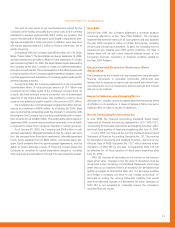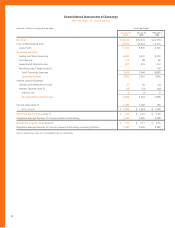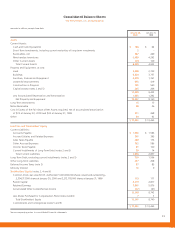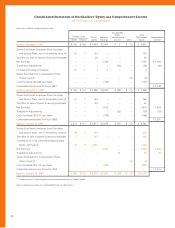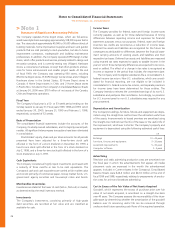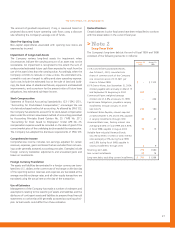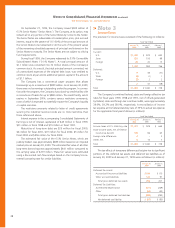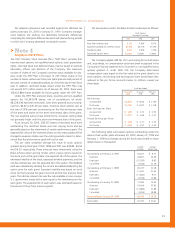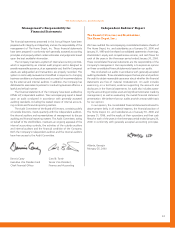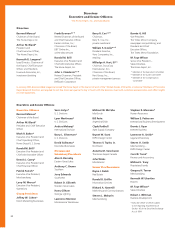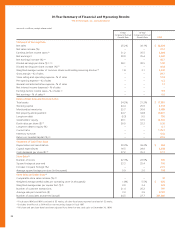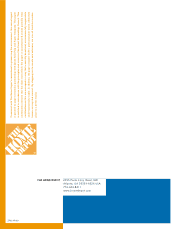Home Depot 1999 Annual Report Download - page 35
Download and view the complete annual report
Please find page 35 of the 1999 Home Depot annual report below. You can navigate through the pages in the report by either clicking on the pages listed below, or by using the keyword search tool below to find specific information within the annual report.
The Home Depot, Inc. and Subsidiaries
The approximate future minimum lease payments under capital
and operating leases at January 30, 2000 were as follows (in millions):
Capital Operating
Fiscal Year Leases Leases
2000 $ 35 $ 466
2001 35 462
2002 35 415
2003 36 384
2004 36 359
Thereafter 505 3,969
682 $ 6,055
Less imputed interest (466)
Net present value of capital
lease obligations 216
Less current installments (3)
Long-term capital lease obligations,
excluding current installments $ 213
Short-term and long-term obligations for capital leases are included
in the Company’s Consolidated Balance Sheets in Current Installments
of Long-Term Debt and Long-Term Debt, respectively. The assets
under capital leases recorded in Net Property and Equipment, net of
amortization, totaled $208 million and $180 million, at January 30,
2000 and January 31, 1999, respectively.
>Note 6
Employee Benefit Plans
During fiscal 1996, the Company established a defined contribution
plan (“401(k)”) pursuant to Section 401(k) of the Internal Revenue
Code. The 401(k) covers substantially all associates that meet certain
service requirements. The Company makes weekly matching cash
contributions to purchase shares of the Company’s common stock, up
to specified percentages of associates’ contributions as approved by
the Board of Directors.
During fiscal 1988, the Company established a leveraged Employee
Stock Ownership Plan and Trust (“ESOP”) covering substantially all
full-time associates. At January 30, 2000, the ESOP held a total of
32,208,550 shares of the Company’s common stock in trust for plan
participants’ accounts. The ESOP purchased the shares in the open
market with contributions received from the Company in fiscal 1998 and
1997, and from the proceeds of loans obtained from the Company
during fiscal 1992, 1990 and 1989 totaling approximately $81 million.
All loans payable to the Company in connection with the purchase of
such shares have been paid in full.
During February 1999, the Company made its final contribution to
the ESOP plan and amended its 401(k) plan. In the amendment, the
Company elected to increase its percentage contribution to the 401(k)
in lieu of future ESOP contributions.
The Company adopted a non-qualified ESOP Restoration Plan in
fiscal 1994. The Company also made its final contribution to the
ESOP Restoration Plan in February 1999 and established a new 401(k)
Restoration Plan. The primary purpose of the new plan is to provide
certain associates deferred compensation that they would have
received under the 401(k) matching contribution if not for the maxi-
mum compensation limits under the Internal Revenue Code of 1986,
as amended. The Company has established a “rabbi trust” to fund the
benefits under the 401(k) Restoration Plan. Compensation expense
related to this plan for fiscal years 1999, 1998 and 1997 was not mate-
rial. Funds provided to the trust are primarily used to purchase shares
of the Company’s common stock in the open market.
The Company’s combined contributions to the 401(k) and ESOP
were $57 million, $41 million and $33 million for fiscal years 1999,
1998 and 1997, respectively.
>Note 7
Basic and Diluted Earnings Per Share
The calculations of basic and diluted earnings per share for fiscal years
1999, 1998 and 1997 were as follows (amounts in millions, except
per share data):
Fiscal Year Ended
January 30, January 31, February 1,
2000 1999 1998
Calculation of Basic Earnings
Per Share:
Net earnings $ 2,320 $ 1,614 $ 1,160
Weighted average number of
common shares outstanding 2,244 2,206 2,188
Basic Earnings Per Share
$ 1.03 $ 0.73 $ 0.53
Calculation of Diluted Earnings
Per Share:
Net earnings $ 2,320 $ 1,614 $ 1,160
Tax-effected interest expense
attributable to 31⁄4% Notes 17 23 23
Net earnings assuming dilution $ 2,337 $ 1,637 $ 1,183
Weighted average number of
common shares outstanding 2,244 2,206 2,188
Effect of potentially
dilutive securities:
31⁄4% Notes 51 72 72
Employee stock plans 47 42 27
Weighted average number of
common shares outstanding
assuming dilution 2,342 2,320 2,287
Diluted Earnings Per Share
$ 1.00 $ 0.71 $ 0.52
Employee stock plans represent shares granted under the
Company’s employee stock purchase plan and stock option plans, as
well as shares issued for deferred compensation stock plans. For fiscal
years 1999, 1998 and 1997, shares issuable upon conversion of the
Company’s 31⁄4% Notes, issued in October 1996, were included in
weighted average shares assuming dilution for purposes of calculat-
ing diluted earnings per share. To calculate diluted earnings per share,
net earnings are adjusted for tax-effected net interest and issue costs
on the 31⁄4% Notes (prior to conversion to equity in October 1999)
and divided by weighted average shares assuming dilution.
31


